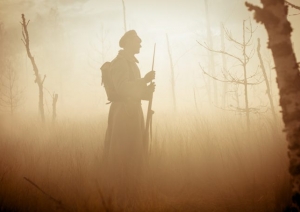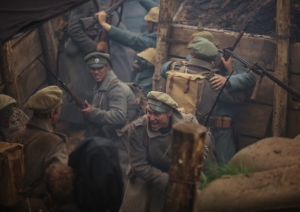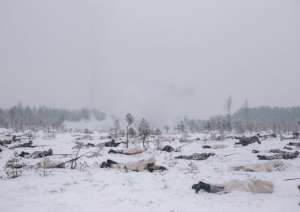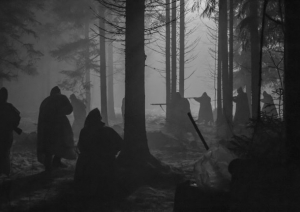For the thirteenth time Latvia has entered a film for the US Academy of Motion Picture Arts and Sciences Oscar awards nomination consideration in the Best International Feature Film category. The panel of experts selected by the National Film Centre (NFC) voted in agreement on director Dzintars Dreibergs’ feature Blizzard of Souls, a film that recently won a National Film Award Lielais Kristaps for best film of the year.

Entries from Latvian studios were evaluated by a panel of experts selected by the National Film Centre – Ieva Romanova, Chair of the Latvian Filmmakers Union; Dace Vilsone, State Secretary, Ministry of Culture; Kristīne Simsone, film critic; Viktors Freibergs, film historian; Dāvis Sīmanis, director, Latvian Academy of Culture professor; Uldis Cekulis, producer, head of studio VFS Films. Film historian and director of the National Film Centre, Dita Rietuma, was elected to head the panel.
Three full-length feature films were entered for evaluation by the panel of experts – the same three that were nominated this year for the National Film Awards Lielais Kristaps as the best feature films of the year. They were: What Silent Gerda Knows from director Jevgeņijs Paškēvičs, The Sign Painter from director Viesturs Kairišs, and Blizzard of Souls from director Dzintars Dreibergs. The panel of experts weighed in via virtual discussion on the films’ potentials, evaluating their different qualities. In the end they agreed that Latvia’s entry for the US Academy of Motion Picture Arts and Sciences Oscar awards nomination in the Best International Feature Film category will be Blizzard of Souls from director Dzintars Dreibergs. The film has to date been seen by 250 000 viewers in film theatres.
In their explanation the experts emphasized – that even in a situation where there are many so-called “war films” out there and some do become popular through international distribution, the film Blizzard of Souls has a chance to stand out as a dynamic, universal and seamless message. Director Dāvis Sīmanis stressed that Blizzard of Souls is an “exceptional attestation to the futility of war that is timely in today’s world when there are military conflicts arising in several locations, – the film shows that in close-up war is an unmanageable, brutal and impersonally ruthless process”. Film historian Dita Reituma pointed out the film’s ability to “achieve a feeling of existential insanity, utilizing subjective camera strategies and cinematographer Valdis Celmiņš’ unique talents; thus the film moves away from precise historical frames or circumstances that would cause it to be treated as a specific nation’s specific historical experience, and the stylistic solution lends a universal meaning to the film.” Producer Uldis Cekulis, in turn, noted that at the beginning of the year, cinematographer Valdis Celmiņš was nominated for an IMAGO award (professional cinematographers awards) for his work on Blizzard of Souls, and that too is a testament to the film’s international convertibility. (http://nkc.gov.lv/aktualitates/filmas-dveselu-putenis-operators-valdis-celmins-nominets-balvai-imago/ )
It should also be noted that films from the other Baltic States have been entered for the Oscars – Lithuania entered feature film Nova Lituania (dir. Karolis Kaupinis), which was screened in Riga during the Baltic Film Days in August, and Estonia – director Veiko Ounpū’s comedy / criminal-film / western The Last Ones that had its premiere in September. On the list of entered films are other works familiar to Latvian film viewers – Agnieszka Holland’s Charlatan (Czech Republic), and Thomas Vinterberg’s Another Round (Denmark). The Academy has received entries from 56 countries to date.
The entry and nomination process for the Oscar awards has been postponed for two months due to the current emergency situation – the awards ceremony that usually takes place at the end of February will now take place on April 25, 2021. Countries have to enter their national offering from October to December 31, 2020. The first list of nominees (10 films) will be announced on February 9, 2021. Due to the pandemic, the rules have been changed to include potential candidates that had their premiere on an online streaming platform as opposed to a (formally obligatory) theatrical release.
This Oscar awards category has been judged and awarded since 1956, and was up until now known as Best Foreign Language Film. In 2019 the name was changed to the International Feature Film Award. In 2019, 93 countries submitted films for this award.
For information on the Oscar awards process:
Zane Kauliņa,
NFC Senior Officer
Promotion of Domestic Films Abroad
(zane.kaulina@nkc.gov.lv
67358866, 26729414)







